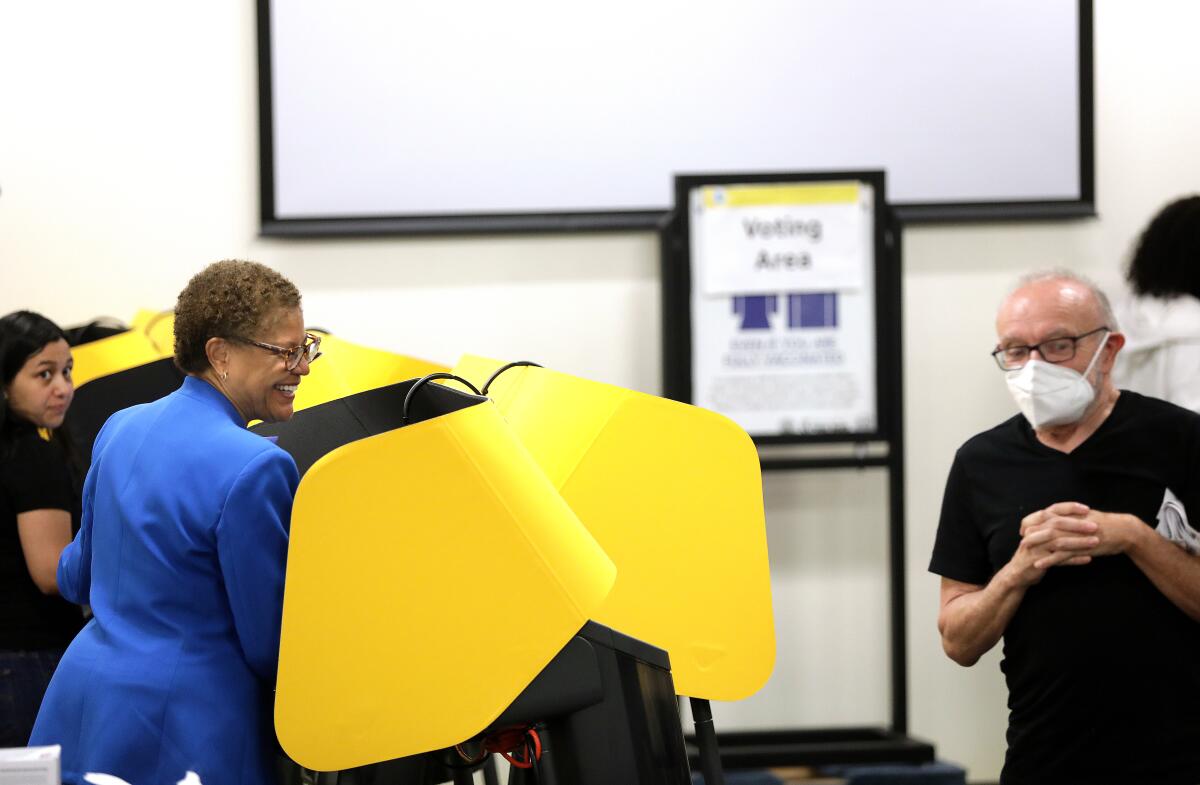Letters to the Editor: Why it’s still too hard to vote in California even with mail-in ballots

- Share via
To the editor: Columnist Steve Lopez does not cover the root cause of low voter turnout in Los Angeles, which is California’s jungle primary. None of the expectations of our nonpartisan, top-two runoff system has come to pass.
I received my ballot in the mail and was ready to fill it out. I have a master’s from a well-known university and completed my doctorate coursework at another school. I also ran a company with more than 1,000 employees. Yet I spent several hours, with the aid of lists that other people had studied and prepared, to actually fill out the ballot.
This is not something that I expect most others to do, especially if the objective is to have greater participation.
In the past, our political parties had primaries. You were registered according to the values and policies that the party offered, and you decided among a small pool of candidates.
Selecting from a dozen or more candidates per office in a jungle primary is no way to run an election, especially if you want broader voter participation.
Jose Reines, Los Angeles
..
To the editor: As one of those who voted, I admit there were many offices on the ballot that I left blank, for what I suspect are some of the same reasons others didn’t bother to vote at all — reasons I have not seen mentioned in all the stories about low voter turnout.
First, there were a lot of incumbents for statewide office on the ballot who were unelected because Gov. Gavin Newsom appointed them. Once in office these people will not be unseated, so why bother voting for someone else?
Second, the winner is almost always whomever the Democratic Party endorses, or whoever paid to get their name on the most slate mailers. I know they will win but sometimes just don’t feel like voting for them, as a form of protest. And when I vote for a Democrat or an independent without an endorsement, I do so knowing they don’t have a chance.
So the problem is not just the sense that our votes won’t matter because of “empty promises and failed policy,” but also that the winners nearly always seem preordained by the party powers that be. And no amount of civics lessons or essays is going to change that.
Kathy Barreto, Culver City
..
To the editor: To those who feel their vote doesn’t count, ask yourself why the Republican Party is working so hard to suppress your right to vote.
Doris K. Reed, Palm Desert
..
To the editor: I agree that more enticing civics classes and school activities for K-12 and college students could lead to increased voter participation. But could we also consider continuing civic education for adults who are not currently in a school setting?
Many eligible voters are nonnative Californians or immigrant citizens such as my parents who were educated in countries with far different governments than our own.
Last week I went to a public library to refresh my memory of whatever I learned about civics in high school so many years ago; the friendly librarian helping me found only a few books on the topic for adults.
It reminded me of when I moved here 22 years ago and asked neighbors how I could learn about my new city. The main response I got was, “Watch the movie ‘Chinatown.’”
Can we please have a readily available, easy-to-understand synopsis of our government offered for free? Call it Continuing Civic Education 101.
Tovah Sands, Woodland Hills






